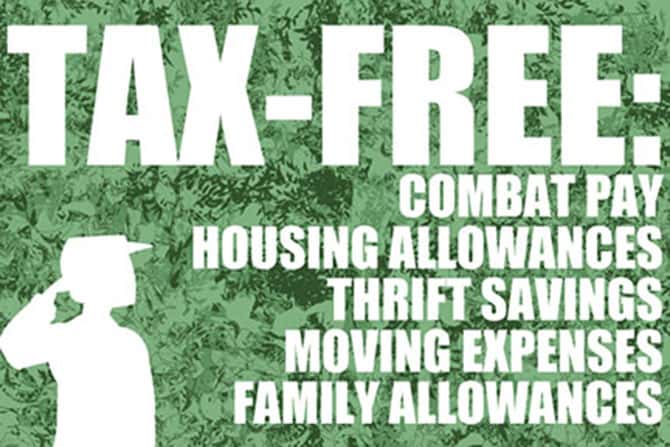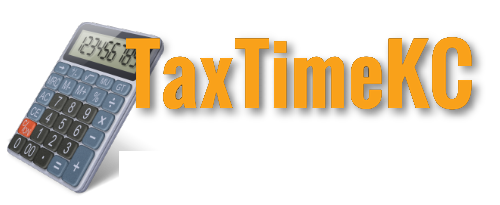
by r Hampton | Aug 1, 2019 | Tax News
tax tips | July 31, 2019 | By Susannah McQuitty

Members of the United States Armed Forces have to file their taxes just like everyone else—almost exactly like everyone else, in fact. Men and women in the military can file their taxes online and follow almost exactly the same process as civilian taxpayers. The exceptions are usually related to tax-free benefits for military members, and those benefits can keep more money in your pockets by lowering your tax obligation.
Here is an overview of the most common tax-saving items that military personnel can use.
Combat pay is tax free
Combat zones are hostile areas recognized and designated by the President of the United States in an Executive order, and the IRS allows tax relief for Armed Forces members stationed there. Any wages earned while stationed in a combat zone are tax free, though officers (excluding commissioned warrant officers) are limited to $8,586 per month of tax-free wages.
Combat pay can boost your tax savings even further, because even though it’s not taxable income, it can still qualify you for the Earned Income Credit (EIC). Since the EIC is a refundable credit, you may get a refund even if you didn’t owe taxes throughout the year.
When you receive your W-2, any tax-free combat pay will be reported as such, so you won’t have to do any extra work when filing your tax return.
Allowances for housing and contributions to qualified savings are tax free
For military personnel, housing allowance is called Basic Allowance for Housing (BAH) and is totally tax free. Same goes for contributions to a Thrift Savings Plan (TSP): Anything you contribute won’t be taxed, so you can deduct the total from your taxable income without itemizing.

Military moving expenses are tax free
More good news here: Though the moving expense deduction was eliminated for civilian taxpayers by the Tax Cuts and Jobs Act of 2017 (TCJA), members of the Armed Forces can still deduct eligible unreimbursed moving expenses. Hopefully most of your moving expenses will be provided by the military, but anything you have to pay out-of-pocket is deductible on your tax return.
Reservists may still be able to deduct out-of-pocket work expenses
Work-related expenses not covered by your employer are no longer deductible for civilians (again, due to the TCJA), but reservists can use Form 2106 to claim this deduction and lower their taxable income. You can claim the deduction for out-of-pocket expenses directly related to your job, as long as you were not reimbursed by your employer.
Other tax-free allowances
When you are provided with allowances that relate directly to the military, you won’t be taxed on the amount of the allowances. Most can be divided into the following categories:
- Family allowances: For expenses related to dependents and your spouse
- Travel/moving allowances: For expenses incurred due to change of station or re-assignment
- Living allowances: A cost-of-living adjustment associated with a high-cost posting station
- Death allowances: For funeral services and burial expenses
That about wraps it up for tax-free wages, expenses, and allowances. Let’s shift gears and take a look at how you can lower your tax obligation by choosing a state domicile.

State taxes and choosing a domicile
It’s no secret that the military will probably keep you on the move between bases for training and other purposes. Many of these moves are between states, so rather than set up residency each time, military members choose a “domicile.” Your domicile is the place where you lived prior to the military, or the place you intend to live after you retire from service.
While you don’t have to live, work, or be stationed in your domicile during your service years, you will be subject to taxes from that state, as well as being registered to vote there and licensed to drive. You’ll want to consider these factors before choosing a state to register as your domicile.
Since each state taxes military income differently, you might want to register with a state that has no income tax: Nevada, New Hampshire, Tennessee, Texas, South Dakota, Washington, Wyoming, Florida and Alaska all fall into that category. Some states with no income tax have high property tax, however, so having several cars in your family may have an effect. Be sure to take your personal situation into account while researching each state before you make a decision.
Your civilian spouse can have a domicile too
Because of updates in 2018 to the Military Spouse Residency Relief Act, or MSRRA, your civilian spouse can also choose to be taxed by your domicile instead of the state where you both live. That way, even though they don’t serve in the military, they can get the same state tax treatment.
Active duty overseas gives extra time to file
If April rolls around and you’re not in the states to manage your tax records and get everything straightened away, you can take advantage of the automatic two-month extension for overseas military personnel. Your taxes will be due June 15 instead of April 15, and if that’s not enough time, you can request an additional four months by filing a Form 4868 to extend your deadline to October 15. If you still need more time, file for a December 15 extension to get another two months.
Now that you know about tax-free wages, expenses, and income, and how to set up your domicile for optimal tax savings, you should have a pretty good strategy to lower your tax obligation and end up with more money in your pocket—especially when you file with 1040.com.
– Story provided by 1040.com

by r Hampton | Jul 29, 2019 | Tax News
The Internal Revenue Service is attempting to rein in some taxpayers who may have failed to report income and pay tax on virtual currency transactions.
Some taxpayers, the IRS says, didn’t pay tax owed; others may have reported their transactions improperly. Either way, IRS Commissioner Chuck Rettig says it’s a big deal.
“Taxpayers should take these letters very seriously by reviewing their tax filings and when appropriate, amend past returns and pay back taxes, interest and penalties,” said Rettig. “The IRS is expanding our efforts involving virtual currency, including increased use of data analytics. We are focused on enforcing the law and helping taxpayers fully understand and meet their obligations.”
The letters are being mailed out now and some 10,000 taxpayers should get one by the end of August. How did they know who should get a letter? The IRS says they got the names of the taxpayers “through various ongoing IRS compliance efforts.”
The IRS reminds that delinquent crypto taxpayers can face penalties – and worse – if their tax liabilities are ignored. Taxpayers who do not properly report the income tax consequences of virtual currency transactions are, when appropriate, liable for tax, penalties and interest. In some cases, taxpayers could be subject to criminal prosecution.
Letters in Three Flavors
The IRS characterizes these letters as “educational,” and they come in three varieties: Letter 6173, Letter 6174, or Letter 6174-A. All three, the IRS says, strive to help taxpayers understand their tax and filing obligations, while instructing them how to correct past errors. All three letters also list the forms the taxpayers will need and where to send them.
Last year the IRS announced a Virtual Currency Compliance campaign aimed at tax noncompliance related to the use of virtual currency. “The IRS will remain actively engaged in addressing non-compliance related to virtual currency transactions through a variety of efforts, ranging from taxpayer education to audits to criminal investigations,” an agency release says.
The IRS’ efforts are not all in education, however. Virtual currency remains an ongoing focus area for IRS Criminal Investigation.
Guidance Forthcoming
IRS Notice 2014-21 states that virtual currency is property for federal tax purposes and provides guidance on how general federal tax principles apply to virtual currency transactions. Compliance efforts follow these general tax principles. The IRS says it is continuing to solicit feedback from taxpayers and practitioners.
The IRS anticipates issuing additional legal guidance in this area in the near future.
More information on virtual currencies can be found on IRS.gov.
– Story provided by TaxingSubjects.com

by r Hampton | Jul 29, 2019 | Tax News
If you’ve always deducted your business vehicle expenses in the past, read on. With the recent changes in the tax code, not everyone can still claim the deduction. Some taxpayers can, but some cannot.
In a nutshell, only a few types of taxpayers can now qualify to deduct auto expenses from their taxes.
Business Owners and Self-Employed Taxpayers
Individuals who either own a business or are self-employed and use their vehicle for business purposes can deduct vehicle expenses on their returns. If the taxpayer uses the vehicle for both personal and business purposes, the expenses must be split. The deduction is based only on the portion of mileage used for business purposes.
There are two methods for figuring car expenses:
- Using actual expenses
- Depreciation
- Lease payments
- Gas and oil
- Tires
- Repairs and tune-ups
- Insurance
- Registration fees
- Using the standard mileage rate
- Taxpayers who want to use the standard mileage rate for a car they own must choose to use this method in the first year the car is available for use in their business.
- Taxpayers who want to use the standard mileage rate for a car they lease must use it for the entire lease period.
- The standard mileage rate for 2018 is 54.5 cents per mile. For 2019, it‘s 58 cents.
There are recordkeeping requirements for both methods.
Employees
Employees who use their car for work can no longer take an employee business expense deduction as part of their miscellaneous itemized deductions reported on Schedule A. Employees can’t deduct this cost even if their employer doesn’t reimburse the employee for using their own car. This is for tax years after December 2017. The Tax Cuts and Jobs Act suspended miscellaneous itemized deductions subject to the 2 percent floor.
However, certain taxpayers may still deduct unreimbursed employee travel expenses; this includes Armed Forces reservists, qualified performing artists, and fee-basis state or local government officials.
For more information, check out IRS Publication 535, Business Expenses.
– Story provided by TaxingSubjects.com

by r Hampton | Jul 25, 2019 | Tax News
The IRS recently highlighted how the Tax Cuts and Jobs Act affected whistleblowers who submit information to the IRS Whistleblower Office.
It turns out that the IRS offers award money to whistleblowers who help investigators discover and prosecute tax evasion. According to the “Whistleblower – Informant Award” page on IRS.gov, “The IRS Whistleblower Office pays money to people who blow the whistle on persons who fail to pay the tax that they owe. If the IRS uses information provided by the whistleblower, it can award the whistleblower up to 30 percent of the additional tax, penalty, and other amounts it collects.”
Whistleblowers will now be notified when cases that arise from their tipoffs have “been referred for audit or examination.” That said, the agency is careful to note that “notification does not necessarily indicate that an audit or examination has been or will be opened,” nor does it mean “the claim will receive an award.”
When it comes to awards, the IRS says that they will send notification “when the taxpayer the whistleblower identified has made a tax payment with respect to which the whistleblower’s information provided.” However, whistleblowers may have to wait years for cases to be resolved, and awards are not always issued when those payments are finally made.
If a whistleblower wants an update on any pending cases they referred to the agency, they will need to send a hand-written request to the IRS Whistleblower Office. The IRS closed the press release by including that contact information:
Internal Revenue Service
1973 N. Rulon White Blvd.
M/S 4110
Ogden, UT 84404
For more information on submitting whistleblower claims, the IRS provided a link to Publication 5251, Whistleblower Claim Process and Timeline.
Sources: “Whistleblower – Informant Award”; “Whistleblower Reforms Under the Taxpayer First Act”
– Story provided by TaxingSubjects.com

by r Hampton | Jul 23, 2019 | Tax News
The nation’s tax practitioners are being reminded federal law requires them to create a written security plan to help protect their clients’ data. The reminder from the Security Summit is more than just a friendly nudge.
“Protecting taxpayer data is not only a good business practice, it’s the law for professional tax preparers,” said IRS Commissioner Chuck Rettig. “Creating and putting into action a written data security plan is critical to protecting your clients and protecting your business.”
The Security Summit, made up of representatives of the IRS, state taxing agencies and the tax industry, has created a checklist for tax pros as starting point for building an adequate security setup. While the first step on the checklist is taking the basic steps to protect computers and email, developing a written security plan is right up there at Number 2.
The Taxes-Security-Together Checklist
- Deploy basic safeguards (termed the “Security Six” by the Security summit partners)
- Create data security plan
- Educate yourself on phishing scams
- Recognize the signs of client data theft
- Create a data theft recovery plan, and call the IRS immediately
Not Just a Good Idea – It’s the Law
Many in the tax professional community do not realize they are required under federal law to have a data security plan.
The Financial Services Modernization Act of 1999, also known as the Gramm-Leach-Bliley (GLB) Act, gives the Federal Trade Commission authority to set information safeguard regulations for various entities, including professional tax return preparers. According to the FTC Safeguards Rule, tax return preparers must create and enact security plans to protect client data. Failure to do so may result in an FTC investigation.
The IRS also may treat a violation of the FTC Safeguards Rule as a violation of IRS Revenue Procedure 2007-40, which sets the rules for tax professionals participating as an Authorized IRS e-file Provider.
The FTC-required information security plan must be appropriate to the company’s size and complexity, the nature and scope of its activities and the sensitivity of the customer information it handles. According to the FTC, a qualified plan lays out how the company will:
- designate one or more employees to coordinate its information security program;
- identify and assess the risks to customer information in each relevant area of the company’s operation and evaluate the effectiveness of the current safeguards for controlling these risks;
- design and implement a safeguards program and regularly monitor and test it;
- select service providers that can maintain appropriate safeguards, make sure the contract requires them to maintain safeguards and oversee their handling of customer information; and
- evaluate and adjust the program in light of relevant circumstances, including changes in the firm’s business or operations, or the results of security testing and monitoring.
The FTC says the requirements are designed to be flexible so that companies can implement safeguards appropriate to their own circumstances. The Safeguards Rule requires companies to assess and address the risks to customer information in all areas of their operations.
It should be noted that the FTC is reevaluating the Safeguards Rule and has proposed new regulations. Be aware changes could be forthcoming that have an impact on the tax preparation community.
Need Help With a Security Plan?
IRS Publication 4557, Safeguarding Taxpayer Data, details critical security measures that all tax professionals should enact. The publication also includes information on how to comply with the FTC Safeguards Rule, including a checklist of items for a prospective data security plan. Tax professionals are asked to focus on key areas such as employee management and training; information systems; and detecting and managing system failures.
Remember that it’s not just the Federal Trade Commission rules that must be satisfied when it comes to protecting client data. The IRS and certain Internal Revenue Code (IRC) sections also focus on protection of taxpayer information and requirements of tax professionals. Here are a few examples:
- IRS Publication 3112 – IRS e-File Application and Participation, states: Safeguarding of IRS e-file from fraud and abuse is the shared responsibility of the IRS and Authorized IRS e-file Providers. Providers must be diligent in recognizing fraud and abuse, reporting it to the IRS, and preventing it when possible. Providers must also cooperate with the IRS’ investigations by making available to the IRS upon request information and documents related to returns with potential fraud or abuse.
- IRC, Section 7216 – This IRS code provision imposes criminal penalties on any person engaged in the business of preparing or providing services in connection with the preparation of tax returns who knowingly or recklessly makes unauthorized disclosures or uses information furnished to them in connection with the preparation of an income tax return.
- IRC, Section 6713 – This code provision imposes monetary penalties on the unauthorized disclosures or uses of taxpayer information by any person engaged in the business of preparing or providing services in connection with the preparation of tax returns.
- IRS Revenue Procedure 2007-40 – This legal guidance requires authorized IRS e-file providers to have security systems in place to prevent unauthorized access to taxpayer accounts and personal information by third parties. It also specifies that violations of the GLB Act and the implementing rules and regulations put into effect by the FTC, as well as violations of non-disclosure rules addressed in IRC sections 6713 and 7216, are considered violations of Revenue Procedure 2007-40. These violations are subject to penalties or sanctions specified in the Revenue Procedure.
Many state laws govern or relate to the privacy and security of financial data, which includes taxpayer data. They extend rights and remedies to consumers by requiring individuals and businesses that offer financial services to safeguard nonpublic personal information. For more information on state laws that businesses must follow, consult state laws and regulations.
Need More Help?
Tax professionals can get help with security recommendations by reviewing the recently revised IRS Publication 4557, Safeguarding Taxpayer Data, and Small Business Information Security: the Fundamentals by the National Institute of Standards and Technology.
Publication 5293, Data Security Resource Guide for Tax Professionals, provides a compilation of data theft information available on IRS.gov.
– Story provided by TaxingSubjects.com

by r Hampton | Jul 21, 2019 | Tax News
Bulgaria’s government has confirmed hackers stole the financial data of millions of its citizens. One researcher told Reuters news service the breach may have compromised the personal records of nearly every adult taxpayer in the country.
Reuters reports the attack was carried out at the end of June and targeted servers in the NRA tax agency. A 20-year-old Bulgarian man – a worker in the tax agency – was arrested in connection with the hack. Government officials say the suspect was responsible for testing computer networks for vulnerabilities. The suspect’s attorney, however, claims there is a “complete lack of evidence” against his client.
The news service reports a person who claimed to be a Russian hacker emailed local media soon after the breach and offered access to the stolen data.
The writer described the government as corrupt, and said fellow hackers compromised more than 100 databases in the attack, including some holding confidential government administrative data.
Government Soft-Pedals Impact
The country’s finance minister claimed only 3 percent of the agency’s database was affected, but still compromising millions of records. Bulgaria has a total population of seven million. The minister stressed that the information wasn’t classified and didn’t affect the country’s financial stability.
A different picture, though, emerged from cyber security specialist Vesselin Bontchev, assistant professor at the Bulgarian Academy of Sciences. Bontchev told Reuters the scale of the attack was huge.
“To the best of my knowledge, this is the first publicly known major data breach in Bulgaria,” he said. “It is safe to say that the personal data of practically the whole Bulgarian adult population has been compromised.”
Bontchev’s assessment seemed to be carried out by the email author claiming to be one of the hackers. His email, sent from a Russian address, claimed more than five million Bulgarian and foreign citizens were compromised – as well as some Bulgarian companies.
Other cybersecurity experts in Bulgaria said the reason the attack was so successful appears not to be related to the skill of the hackers, but the poor security defenses at the nation’s tax agency.
Media speculation seemed to center around the country’s reputation for corruption as the underlying reason for the hack. The anti-graft organization Transparency International ranks Bulgaria as the most corrupt country in the European Union.
Besides possible investigations by the government’s national security council and local authorities, Reuters says Bulgaria plans to seek help from the European Union’s cybersecurity agency to audit its most sensitive systems.
– Story provided by TaxingSubjects.com
















 TAXTIMEKC
TAXTIMEKC